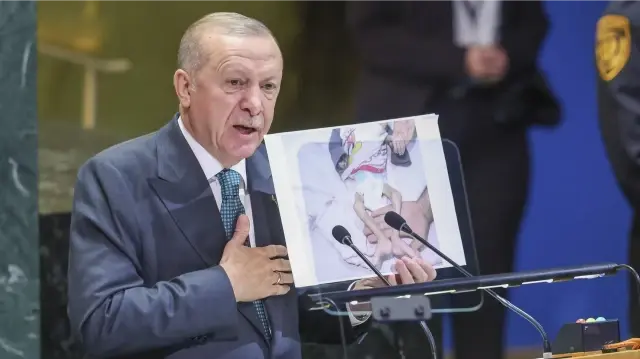Erdoğan's Palestine message

President Erdoğan’s statement at the United Nations that “the Palestinian cause now belongs to the world” signals a fundamental shift in global perception of the issue. Long framed as an “Israeli–Arab conflict” and downplayed through efforts to normalize relations between Arab states and Israel, the Palestinian question has now been laid bare before global public opinion as a matter rooted squarely in Israel’s occupation. Over the past two years, Israel’s ethnic cleansing efforts have become impossible to deny, and the resulting protests and outrage worldwide have cornered the very governments that back Israel. Israel’s genocide—backed by the United States—has boxed Washington and its Western allies into a corner and completely altered how the world sees the Palestinian struggle.
The Collapse of the Peace Process
Erdoğan underscored that Prime Minister Netanyahu’s government seeks to “make the establishment of a Palestinian state impossible” and stressed that the world cannot remain silent in the face of genocide and the forced displacement of Palestinians. The atrocities in Gaza can be seen as the outcome of Israeli governments’ steady retreat from the idea of a Palestinian state since the 1990s. Successive Israeli administrations have taken every step to undermine Palestinian sovereignty while using the never-ending “peace process” to block the development of real statehood capacity for Palestinians. By insisting on conditions such as recognition of Israel as a “Jewish state,” Israel has often painted Palestinians as the intransigent party and, for a time, succeeded in framing the issue primarily as one of terrorism. But, as Erdoğan noted, the ethnic cleansing attempts through genocide and forced migration have now exposed Israel’s true intentions.
Many Western states—excluding the United States—have begun formally recognizing Palestine, effectively conceding that the American-sponsored peace process has collapsed. For decades, that process—predicated on negotiations over borders, Jerusalem’s status, and refugees before recognizing Palestinian statehood—allowed Israel to expand its occupation at Palestine’s expense. The U.S. had consistently vetoed recognition, calling it “unconstructive” and arguing it would derail peace talks. But that position has lost its influence, as shown by France, the UK, Canada, Australia, Portugal, Spain, and Belgium deciding to recognize Palestine. The fact that countries no longer wait for a meaningful peace process before extending recognition marks a critical psychological turning point.
Recognition of Palestine and UN Security Council Reform
It is widely acknowledged that President Erdoğan has been the most vocal champion of the Palestinian cause on the international stage. Condemning Israel’s expansion of settlements and its refusal to accept a genuine solution, Erdoğan has consistently supported efforts at the UN to recognize a Palestinian state. Türkiye has repeatedly protested Israeli settlement construction, seeing it as a deliberate strategy to shrink Palestinian lands. Obama’s failure to persuade Netanyahu to freeze settlements—at great political cost—made Türkiye’s persistent objections even more significant. At the UN podium, Erdoğan famously displayed maps of Palestinian land loss, drawing global attention to Israel’s ongoing occupation. His insistence on raising the issue over the past two years, especially amid Israel’s genocide and occupation, has pressured many states to take a clearer stand.
With many Western nations now shifting their position, the United States finds itself increasingly isolated diplomatically. Washington’s repeated use of its veto—at least three times in three years—to shield Israel has rendered the UN Security Council dysfunctional, starkly illustrating the international system’s inability to address wars and conflicts. Erdoğan’s longstanding criticism of the Security Council’s structure, which concentrates decision-making and enforcement power in the hands of five permanent members, stems from this reality. The Council’s failure to overcome major powers’ competing interests and deliver solutions to global crises is most glaring in the case of Palestine. Erdoğan’s repeated calls for UN reform are clearly gaining traction.
While recognition of a Palestinian state remains largely symbolic, it breaks psychological barriers and underscores the flaws of the UN system. Erdoğan’s persistent advocacy has been central—not only to advancing recognition efforts for Palestine but also to pushing for reforms in the Security Council. His message on Palestine, delivered consistently for years, continues to play a decisive role in shaping both debates.
Reklam yükleniyor...
Reklam yükleniyor...








Comments you share on our site are a valuable resource for other users. Please be respectful of different opinions and other users. Avoid using rude, aggressive, derogatory, or discriminatory language.